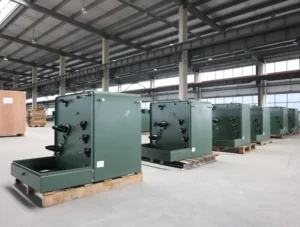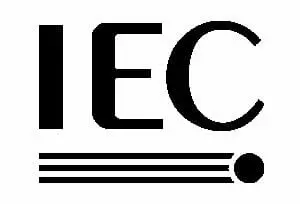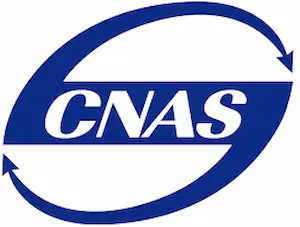Introduction of Different Types of 3 Mva Transformer
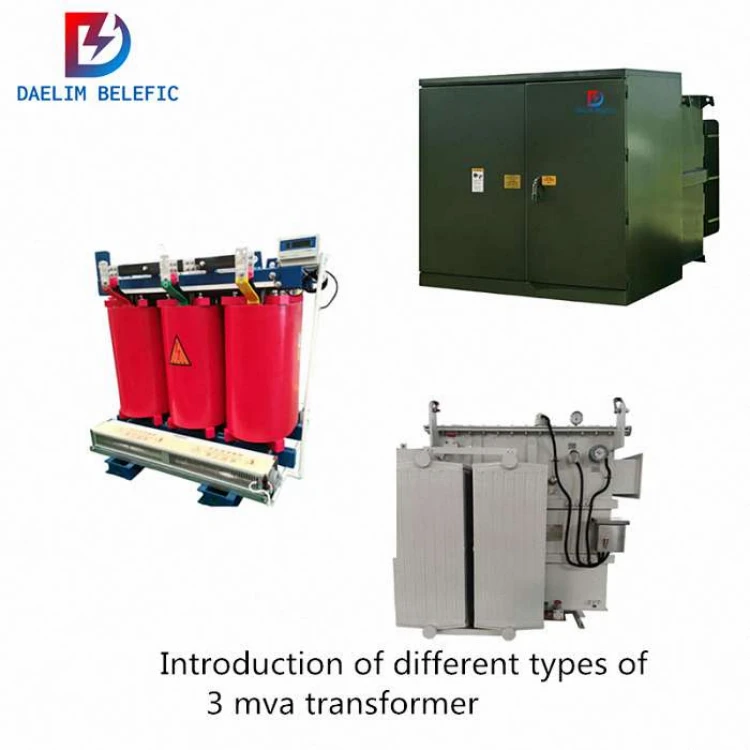
Daelim produce diffrent 3 mva transformer, in this article we will introduce 3 mva substation transformer, 3 mva pad mounted transformer and 3 mva dry type transformer(also named 3 mva cast resin transformer)
The general HV for 3 mva trans is 13200GrdY/7621V, 34500GrdY/19920V, 12470GrdY/7200V, : 13800GrdY/7968V, 25000V D, 24940V D, etc.
The general LV for 3 mva transformer is 480GrdY/277, 600GrdY/347V, 800GrdY/462V, 415GrdY/240V, etc.
Daelim can provide specific accessories for different project, such as:
65℃ average winding
temperature rise
rating75℃ average winding temperature rise rating
55/65℃ average winding
temperature rise rating
65/75℃ average winding
temperature rise rating
55/75℃ average winding
temperature rise rating
K factor such as K13
Stainless steel housing
Biodegradable insulation fluid
Gauges with contacts
Greater efficiency
Surge Arrestors
Pad-mounted Transformer
Dry-type Transformer
Oil immersed transformer
Table of Contents
What does MVA mean transformer?
MVA is megavolt ampere, a measure of power.
3 mva = 3000 kva = 3000000va
The guaranteed value of the output capacity of the transformer in the rated state, expressed in kilovolt-ampere (kVA) (volt-ampere VA and megavolt-ampere MVA are not commonly used),
Because the transformer (transformer ratio tester) has a high operating efficiency, usually The rated capacity design value of the primary and secondary windings, etc. It belongs to the physical unit, kVA, which generally refers to the maximum transformation capacity of the transformer.
What is ansi standard transformer kva ratings?
For three-phase transformers, the kva includes Three-phase transformers
15kva, 30kva, 45kva, 75kva, 112.5kva, 150kva, 225kva, 300kva, 500kva,750kva, 1mva
1.5mva, 2mva, 2.5mva, 3.75mva, 5mva, 7.5mva, 10mva, 12mva, 15mva, 20mva, 25mva, 30 mva, 37. 5mva, 50mva, 60mva, 75mva, 100mva.
What is a 3 mva substation transformer?
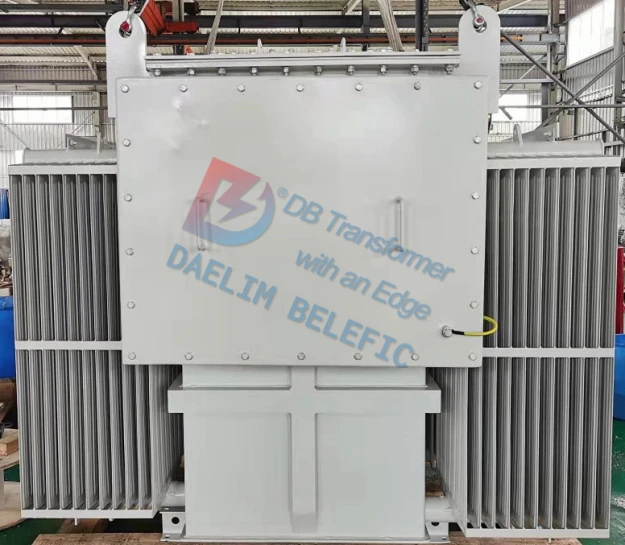
Substation Transformer is one of the main electrical equipment of substation. It can be said that substation transformer is the heart of substation, and its main function is to transform voltage.
It is known from electrical engineering that the greater the current flowing in the transmission line, the greater the loss of electrical power.
When transmitting a certain power, the larger the current, the lower the voltage, so the use of high-voltage transmission can reduce power loss, so the power generated by the power plant must be boosted by the transformer for transmission, and the high voltage is sent to the power-consuming area. After that, it cannot be used directly, so a transformer is used to convert the high voltage into a low voltage, that is, the voltage required by the user.
The function of the substation transformer is to transform the voltage. It can change one voltage level into another voltage level of the same frequency. The transformer that changes from low voltage to high voltage is called “step-up transformer” or “booster transformer”.
After boosting, it is conducive to long-distance transmission. , The electric energy is delivered to the load center to meet the needs of different users after being stepped down by the transformer.
A transformer that steps down the voltage is called a “step-down transformer” or “reducing transformer”
The basic working principle of the transformer is the principle of electromagnetic induction. It is to convert the voltage and current of one level into the voltage and current of another level. It consists of two or more windings wound on the same iron core, and the windings are connected by an alternating magnetic field.
Substation Transformer is the main equipment of substation, its heart, center, and plays a decisive role in substation.
Typical 3 mva transformer specification data sheet:
Project | DESCRIPTION | UNITS | OFFERED | |
A | GEBERAL BACKGROUND |
|
| |
A.1 | Provider | – | DAELIM | |
A.2 | Model | – | S-3000-34.5/0.48 | |
A.3 | Delivery term |
| CIF | |
A.4 | Type | – | Oil immersed | |
A.5 | Rules | – | IEEE C57.12.00,IEEE C57.12.36, IEEE C57.12.90 | |
B | ENVIRONMENTAL CHARACTERISTICS AND NETWORKS |
|
| |
B.1 | CHARACTERISTICS OF THE NETWORKS TO WHICH THE EQUIPMENT WILL BE CONNECTED |
|
| |
| Voltage | frequency | Hz | 60 |
|
| Nominal voltage(NSEG 8.E.n.75) | kV | 34.50 |
|
| Nominal voltage(NSEG 8.E.n.76) | kV | 0.480 |
B.2 | ENVIRONMENTAL CONDITIONS OF THE INSTALLATION PLACE |
|
| |
B.2.1 | Maximum ambient temperature | °F | 105 | |
B.2.2 | Minimum ambient temperature | °F | -15 | |
B.2.3 | Maximum height of sea level | Feet | 3300 | |
C | GENERAL CHARACTERISTICS |
|
| |
C.1 | Standards used in manufacturing: |
| IEEE Std. C57.12.00 | |
D | SERVICE TECHNICAL CHARACTERISTICS |
|
| |
D.1 | Primary winding tension | kV | 34.50 | |
D.2 | Secondary winding tension | kV | 0.480 | |
D.3 | System short circuit current | kA | According to project | |
D.4 | N° phases |
| 3 | |
E | TECHNICAL CHARACTERISTICS |
|
| |
E.1 | Type of cooling: |
| KNAN/KNAF | |
E.2 | Powers at 65º C according to type of cooling |
|
| |
| Power KNAN | MVA | 2.501 | |
| Power KNAF | MVA | 3.0 | |
E.3 | Impedance (KNAN), Nominal Voltage | % | 5.6 | |
E.4 | Temperature rise coiled to the installation temperature (coiled – oil – hottest point) | ºC | 65 – 65 – 80 | |
E.5 | Nominal Voltage (between phases): |
|
| |
E.5.1 | – Primary winding | kV | 34.50 | |
E.5.1.1 | Voltage taps |
| ±2*2.5% | |
E5.2 | – Secondary winding | kV | 0.48 | |
E.6 | Winding Connection |
| Dyn1 | |
E.6.1 | – Primary winding |
| D | |
E.6.2 | – Secondary winding |
| yn | |
E.7 | High Voltage |
|
| |
| BIL | KV | 150 | |
E.8 | Low Voltage |
|
| |
| BIL | KV | 30 | |
E.9 | Polarity |
| Substractive | |
E.10 | No load Losses KNAN, nominal Voltage |
|
| |
| 100% Vn |
| 2.70KW | |
E.11 | Load losses KNAN, nominal Voltage |
|
| |
| 100% Vn |
| 20.64KW | |
E.12 | Total losses |
| 23.34KW | |
E13 | Losses tolerance |
| No-load loss 10%, total loss 6% | |
E.14 | CONTACTS OF CONTROL ACCESSORIES, AND ADDITIONAL ACCESSORIES |
|
| |
E.14.1 | Nameplate of anodized aluminum laser engraved | 3 | YES | |
E.14.2 | Full height, top entry cabinet for HV Terminal | 1 | YES | |
E.14.3 | Throat for LV Terminal | 1 | YES | |
E.14.4 | De-energized tap-changer | 1 | YES | |
E.14.5 | 1.0” upper fill plug with filter press connection | 1 | YES | |
E.14.6 | 1.0” drain valve with sampling device | 1 | YES | |
E.14.7 | Cover-mounted automatic pressure relief device | 1 | YES | |
E.14.8 | Welded cover with bolted manhole | 2 | YES | |
E.14.9 | Lifting lugs | 4 | YES | |
E.14.10 | Liquid level gauge | 1 | YES | |
E.14.11 | Dial type thermometer | 1 | YES | |
E.14.12 | Pressure/vacuum gauge | 1 | YES | |
E.14.13 | SS ground pads | 3 | YES | |
E.14.14 | Nitrogen blanket with purge valve | 1 | YES | |
E.14.15 | Touch-up paint (aerosol cans) | 2 | YES | |
E.14.16 | Rapid pressure rise relay | 1 | YES | |
E.14.17 | Winding temperature indicator | 1 | YES | |
E.14.18 | Auxiliary contacts for pressure relief device | 1 | YES | |
E.14.19 | Auxiliary contacts for liquid level gauge | 1 | YES | |
E.14.20 | HV Bushing | 3 | YES | |
E.14.21 | LV Bushing (Epoxy) | 4 | YES | |
E.14.22 | Arrestor | 3 | YES | |
E.15.1 | Manufacturing Standard |
| IEEE | |
E.15.2 | HV bushing type | 3 | Porcelain bushings | |
E.15.3 | Insulator color |
| Gray 70 | |
E.15.4 | LV bushing: | 4 | Epoxy LV bushings, each with 8 holes | |
E.15.5 | Control Box | 1 | YES | |
E.15.6 | Fans | 2 | YES | |
F | OIL PROPERTIES |
|
| |
F.1 | Commercial designation |
| FR3 Oil | |
F.2 | Rule |
| IEEE Std C2™-2002 | |
G | TESTS ACCORDING TO CONSTRUCTION STANDARD |
|
| |
G.1 | Routine Tests (ANSI C.57.12.90) | – | IEEE C57.12.90 | |
H | Warranty |
|
| |
H.1 | Warranty | – | 2 years | |
What is a 3 mva pad mounted transformer?
3 mva pad mounted transformer has wide application, such as solar plant (CHECK DAELIM PAD MOUNTED TRANSFORMER APPLICATION IN SOLAR PROJECT ), wind power plant, data centers, mining industry, shopping centers, etc. Daelim can provide 3 mva transformer according to ANSI/IEEE C57.12.34, CSA C227.4, CSA C227.5 and other standards.
3 mva pad mounted transformer solution for mining projects
Transformer, Three Phase, Pad Mount,3000 kVA 34500/416V | |||
ITEM | DATA | UNIT | Offered |
1 | Supplier | …. | DAELIM |
2 | Model | …. | ZGS-H-11-2600-34500-416/240 |
3 | Country of origin | …. | CHINA |
4 | Standard manufacturing and testing | …. | IEEE Std. C57.12.00 IEEE Std. C57.12.90 IEEE Std. C57.12.34 |
5 | Features | ||
5.1 | Type | Loop feed pad mount | |
5.2 | Installation | Outdoor | |
5.3 | Ambient temperature | °C | -10°C-35°C |
5.4 | Altitude | m | 2000m |
5.5 | Rated Power | kVA | 3000 |
5.6 | HV | V | 34500 Delta |
5.7 | LV | V | 480GrdY/277 |
5.8 | Rated Frequency | HZ | 60 |
5.9 | Cooling System | KNAN | |
6 | Number of winding | 2 | |
6.1 | Number of phase | 3 | |
6.2 | Core/Shell | Core type | |
6.3 | Refrigerant | FR3 Oil# (PCB FREE) | |
6.4 | Working-Temperature | °C | -40 to +40°C |
6.5 | The temperature rise -Top oil | °C | 65 |
6.6 | The temperature rise –Winding | °C | 65 |
6.7 | Hot spot | °C | 80 |
7.1 | Losses | ||
7.1.1 | No load losses | W | 3100 |
7.1.2 | Load loss | W | 23000 |
Total loss | W | 26100 | |
7.1.3 | Tolerance | 10% NLL, 6% Total Loss | |
7.2 | Vector Group | Delta-Wye | |
7.3 | Core material | Grain oriented silicon steel | |
7.4 | Core legged | 3 | |
7.5 | Winding material | Aluminum | |
7.6 | Tap changer | ||
7.6.1 | On load or off-circuit | off-circuit | |
7.6.2 | Position of tapped winding | HV | |
7.6.3 | Tap Voltages HV | % | ±2×2.5% |
7.6.4 | Highest voltage for the enquipment | kV | 35 |
7.6.5 | Rated current of tap changer | A | 63 |
7.7 | High voltage electrical characteristics of transformers and assembled load break terminals | ||
7.7.1 | Insulation class | kV | 35 |
7.7.2 | BIL | kV | 150 |
7.8 | Low voltage | ||
7.8.1 | Insulation class | kV | 1.2 |
7.8.2 | BIL | kV | 30 |
7.8.3 | Audible sound level | db | 55 |
8 | Impedance | % | 5.75 |
8.0.1 | Impedance tolerance | ±7.5% | |
8.1 | Tank | Mild steel | |
8.1.1 | Colors | Munsell No.7Gy3.29/1.5 | |
8.2 | Total Dimentions | ||
8.2.1 | Height | mm | TBD |
8.2.2 | Depth | mm | TBD |
8.2.3 | Width | mm | TBD |
8.3 | Weight | ||
8.3.1 | Oil | L | 2300 |
8.3.2 | Total | kg | 7200 |
8.4 | Accessories including: | ||
8.4.1 | Lifting lug | 4 | |
8.4.2 | Hinged door | 2 | |
8.4.3 | Parking stand bracket | 6 | |
8.4.4 | LV bushing | 4 | |
8.4.5 | Pressure relief valve | 1 | |
8.4.6 | Drain and sampling valve | 1 | |
8.4.7 | Ground Strap cooper | 1 | |
8.4.8 | HV bushing insert | 6 | |
8.4.9 | Ground bar | 1 | |
8.5.0 | Nameplate | 1 | |
8.5.1 | Bayonet fuse | 3 | |
8.5.2 | Tap changer | 1 | |
8.5.3 | Bushing well | 6 | |
8.5.4 | Four position LB Switch | 1 | |
8.5.5 | CEA ground bracket assy | 1 | |
8.5.6 | Dial-type thermometer gauge with auxiliary contacts | 1 | |
8.5.7 | Liquid level gauge with auxiliary contacts | 1 | |
8.5.8 | Sudden pressure relay with seal-in relay | 1 | |
8.5.9 | Cover-mounted pressure relief device | 1 | |
8.5.10 | Pressure relief valve | 1 | |
8.5.11 | Pressure-vacuum gauge with bleeder | 1 | |
10 | Warranty: | Years | 2 |
What is a 3 mva dry type transformer?
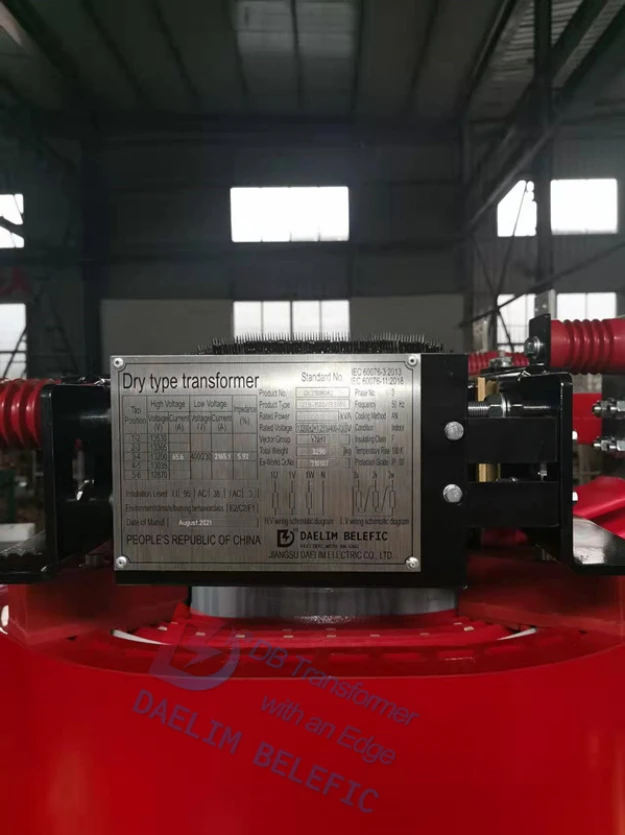
Below we are Daelim dry type cast resin solution of 3 mva transformer:
NO. | Description | Unit | Guaranteed Value |
1 | Country of Origin |
| CHINA |
2 | Standard |
| IEC 60076/ / ETG-1020 |
3 | Type |
| SCLB-11/0,40-23-3.000 |
4 | Quantity |
| TBD |
5 | Class |
| E2 – C2 – F1 |
a) | Environmental Class |
| E2 |
b) | Weather Class |
| C2 |
c) | Fire Endurance Class |
| F1 |
6 | Manufacturer |
| Jiangsu Daelim Electric Co.,Ltda. |
7 | Installation |
| Indoor (IP00) |
8 | Max/Min Ambient Temperature | m/℃ | +40/-5 |
9 | Altitude |
| ≤1000m |
10 | Rated Power | kVA | 3.000 |
11 | HV | kV | 11 |
12 | LV | KV | 0,4/0,23 |
13 | Rated Frequency | Hz | 50 |
14 | Cooling System | AN | AN |
15 | Number of Winding | 2 | 2 |
16 | Number of Phase | 3 | 3 |
17 | Core | Core type | Core type |
18 | Impedance | % | 6 |
19 | Temperature Rise of Winding | °K | 100 |
20 | MV/LV Insulating Class | kV | 17,5kV / 0,72kV |
21 | System Short Circuit Level | kA | 20 |
22 | MV BIL | kV | 95kV / NA |
23 | MV/LV Power Frequency | kV | 38kV/ 3kV |
24 | Creepage Distance | mm/kV | 25 |
25 | Losses(Tolerances Acc.to IEC60076) |
|
|
a) | No Load Losses | kW | TBD |
b) | Short-Circuit Loss | KW | TBD |
26 | Vector Group | Dyn1 | Dyn1 |
27 | Polarity | Substractive | Substractive |
28 | Core Material | – | cold rolled grain oriented silicon steel sheets |
29 | Core Type | – | Stacked / Steplap |
30 | Winding Material |
| Aluminum |
31 | Noise Level (Full Load) | db | < 65 |
32 | Insulating Class |
| F (155°C) |
33 | K Factor |
| 1 |
34 | Tap changer | Yes | Yes |
a) | On Load or Off-Circuit |
| Off-Circuit |
b) | Position of Tapped Winding |
| MV side |
| Tapping Range |
35 | Enclosure |
a) | Material |
36 | General Dimension / Weight (without enclosure) |
a) | Length |
b) | Width |
c) | Height |
e) | Weight |
What are the test items for 3 mva transformer? (know more about transformer testing)
l Ratio, polarity and phase relation tests using all tap settings
l Winding resistance measurement tests
l Insulation power factor
l Full wave and reduced wave impulse test when specified
l Applied and Induced potential tests
l No-Load losses at rated current
l Total losses at rated current
l Percent impedance at rated current
l Excitation current (100% voltage) test
l Leak test
3 mva transformer oil preventive maintenance plan
In transformers, transformer oil can enhance insulation, accelerate heat dissipation, and extinguish arcs. If there is oil leakage, low oil level, oil deterioration, etc., which are not detected in time, it will lead to shortened life of the transformer, power outages, etc., and even fire. Therefore, it is necessary to take some preventive measures on the oil.
Prevent the transformer oil level from being too low
When the transformer is in operation, an increase or decrease in temperature will cause a slight change in the oil level. The oil level has dropped a lot, which cannot be observed from the oil level gauge. Generally, the transformer has oil leakage.
At this time, first check whether the mailbox is damaged, check the tightness of the oil drain valve, and the condition of the oil level gauge. Oil leakage will aggravate the aging of the transformer and shorten the service life of the transformer. Therefore, it should be checked and maintained regularly.
Check the transformer oil leakage
Check the oil leakage, if the situation is serious, it needs to be shut down for rectification.
First find the oil leak point, generally in a place with a lot of dust or high humidity, it is easy to leak oil.
If oil leaks from screws, flanges, etc., tighten the screws.
Then check whether the flange is damaged and whether the gasket is aging.
The large forest layer successfully dealt with the oil leakage of the transformer once.
Because the casing was loosened during transportation, we repaired the casing and replaced the gasket in time.
Finally, the transformer went smoothly again.
Identify the quality of transformer oil from smell and vision
To determine the quality of the transformer oil, the withstand voltage test can be done.
If the quality does not meet the requirements after the test, it is necessary to filter the oil or change the oil. Transformer oil directly affects the insulation performance of the transformer, and it is necessary to pass electrical tests to identify the qualification. In some cases, one can identify quality by smell and sight.
Smell: Generally, transformer oil is odorless or smells like kerosene. If there is any other smell, the oil has gone bad.
Look: The color of the oil generally looks yellowish, perhaps darker. The oil should be transparent, if it is opaque, it means that the content of impurities in it is high.
Fill transformer oil timely
Due to the cold weather in winter, the oil level of the transformer will generally drop.
When the oil level is not displayed, the oil should be added to the oil level line in time.
Pay attention to when supplying oil to the transformer in operation.
Transformers of 35 kV and above should be filled with the same brand of oil and a voltage withstand test; transformers of 10 kV and below can be filled with different brands of oil, but do voltage withstand test for the mix oil.
After refueling, check the Buchholz relay, release the gas in time, and reconnect the Buchholz relay to the trip circuit.
Avoid direct light exposure to transformer oil
Transformer oil will be oxidized faster under the action of ultraviolet rays. Therefore, transformer oil is not allowed to be exposed to direct light. To prevent the transformer oil from being exposed to light, it must be packed in an opaque container.
Check the temperature of the oil surface thermometer on the top of the tank
Try to control the upper oil temperature of the transformer not to exceed 85 degrees Celsius, that is, the difference between the temperature and the room temperature is required to be less than 55 degrees Celsius. If the oil temperature suddenly rises when the transformer is running, it is a manifestation of overheating inside the transformer.
The external reason is that the transformer is seriously overloaded; the internal reasons include the core fire, the short circuit between the winding turns, the internal screw loosening, and the cooling device failure.
Dispose of deteriorated transformer oil in time
If the transformer oil frequently runs overheated or enters water or absorbs moisture, the oil quality will deteriorate. The use of oil that does not meet the standard value can easily cause breakdown discharge between the winding and the casing, causing serious accidents.
Therefore, the insulating oil must be filtered and regenerated. If the transformer oil is found to be damp, it should be dried; if it is found to be aging, it should be purified and regenerated.
There are filtration, drying and clarification methods to separate transformer oil from moisture and impurities. Chemical treatment can also be used to remove the acid and alkali in the oil and then use drying and filtration to regenerate the transformer oil.

